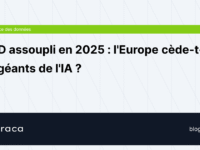Publié : 25 November 2025
Actualisé : 9 hours ago
Fiabilité : ✓ Sources vérifiées
Je mets à jour cet article dès que de nouvelles informations sont disponibles.
📋 Table of Contents
This is the quote. It can span multiple paragraphs.
Hold on tight, because Europe is shaking up its digital rulebook, and it’s bound to make waves! The European Commission has just unveiled its “Digital Omnibus Package,” a proposal that could be the biggest relaxation of the famous GDPR since its adoption in 2018. The stated goal? To reduce “regulatory fatigue” and boost European innovation in the face of American and Chinese tech behemoths. But behind this simplification lies a fascinating debate: are we sacrificing our digital rights on the altar of competitiveness? Or is this a pragmatic modernization essential to catch the AI train?
In this article, we’ll break down what’s happening, without the indigestible jargon, so you can understand the stakes of this “historic turning point.”
🤯 Europe’s Big Digital Shake-Up
Just imagine: on November 19, 2025, the European Commission proposes to amend not one, but FIVE of our most important digital regulations. Yes, all at once! GDPR, the e-Privacy directive, the Data Act, NIS2, and even the AI Act, which isn’t even fully in force yet. It’s a real legislative sweep.
The idea behind all this? To relieve European businesses. We’re talking about annual savings of 10 to 20 billion euros in compliance costs. A boon for our SMEs and startups that often feel crushed under the weight of regulations.
Key Takeaway: The Digital Omnibus Package aims to simplify, harmonize, and accelerate digital innovation in Europe by easing the regulatory burden.
📦 The “Digital Omnibus Package”: What Is This Beast?
Concretely, this “digital omnibus package” is an ambitious legislative proposal. It’s divided into two main parts. The first tackles data and privacy (GDPR, e-Privacy, Data Act, NIS2). The second specifically targets the AI Act, despite it being so new!
The ambition is clear: to create an environment more conducive to innovation, especially in AI, where Europe lags behind (only 4% of global AI models are developed here). But to achieve this, concessions sometimes have to be made.
| Point | Key Figure |
|---|---|
| Expected Annual Savings | €10 to €20 billion |
| Targeted Compliance Cost Reduction | 30% |
| Major Regulations Amended | 5 |
| AI Act Deadline Postponed | December 2027 (instead of August 2026) |
🌍 Why Now? The Geopolitical Chess Game
It’s no coincidence that this proposal is coming now. The Draghi report of September 2024 sounded the alarm on Europe’s structural lag in digital technology. Compliance costs are astronomical, eating up to 10% of Europe’s GDP according to some industry players.
Add to that Donald Trump’s repeated criticisms of “excessive” European regulations, and you get an explosive cocktail. The Commission finds itself between the hammer of competitiveness and the anvil of fundamental rights.
Important: The decision to revise these texts is influenced by economic pressures (European competitiveness) and geopolitical ones (international criticism).
🤖 GDPR on AI Life Support?
The General Data Protection Regulation, a text many consider the global standard for privacy protection, is at the heart of the changes. And the most controversial one concerns artificial intelligence.
The big news? The introduction of a new Article 88c. It would recognize legitimate interest as a legal basis for the development and operation of AI models. In other words, companies could use our personal data to train their AIs without necessarily asking for our explicit consent, provided it is deemed “necessary and proportionate.”
Before this reform, it was much stricter. Clear consent or a very solid legal basis was required. This created gray areas and disputes. Now, access to massive volumes of data – the fuel for generative AIs like ChatGPT – would be greatly facilitated.
🤔 Legitimate Interest: An Open Door or a Sieve?
This is where the shoe pinches, or where it unblocks, depending on your perspective. For the Commission, it’s an essential legal clarification. It would allow European AI “champions,” like Mistral AI, to compete on equal terms with Silicon Valley giants.
This clarification resolves legal uncertainties and aligns GDPR with the jurisprudence of the Court of Justice of the European Union. It would allow European players (Mistral AI, Aleph Alpha) to compete with OpenAI and Google.
But privacy advocates are crying foul. Organizations like NOYB (Max Schrems’ group) and 127 NGOs denounce “uncontrolled access to intimate data” without consent. For them, GDPR would become a “legal sieve” for tech giants. It’s the battle between innovation at all costs and the protection of our personal information.
⚖️ Chain Reactions: Tech vs. Privacy
The debate is heated. On one side, the tech industry hails it as common sense, a sign that Europe finally understands the stakes of the AI race. On the other, digital rights associations and concerned citizens see a major setback, a capitulation to lobbyists.
It’s a classic tension between two visions of progress: one that prioritizes speed and growth, the other that insists on ethics and individual protection. This package attempts to strike a balance, but it’s clear that no one will be entirely satisfied.
🚀 And for You, What Changes?
For businesses, and especially DPOs (Data Protection Officers), this is a period of adaptation. Compliance strategies, AI impact assessments, and potentially data processing procedures will need to be reviewed.
For citizens, this means being even more vigilant about how our data is used. If legitimate interest is broadened, it is crucial to understand under what conditions our information can be used without our explicit consent. Corporate transparency will become more important than ever.
Key Takeaway: Anticipate these changes! Review your internal policies and stay informed about implementation guidelines to best navigate this new regulatory landscape.
This Digital Omnibus Package is a risky bet for Europe. A step forward for digital competitiveness, or a step back for our fundamental rights? Time will tell, but one thing is certain: the debate has only just begun.














0 Comments